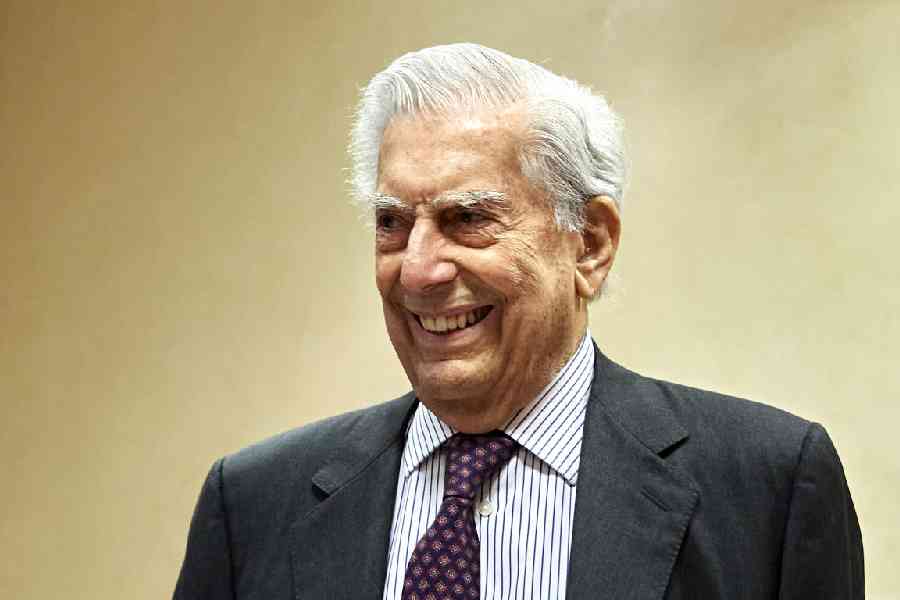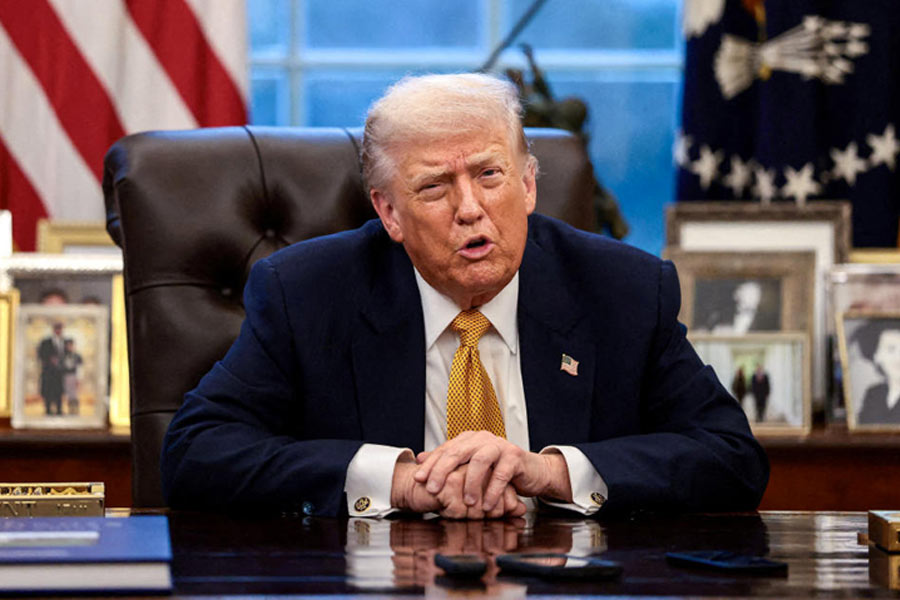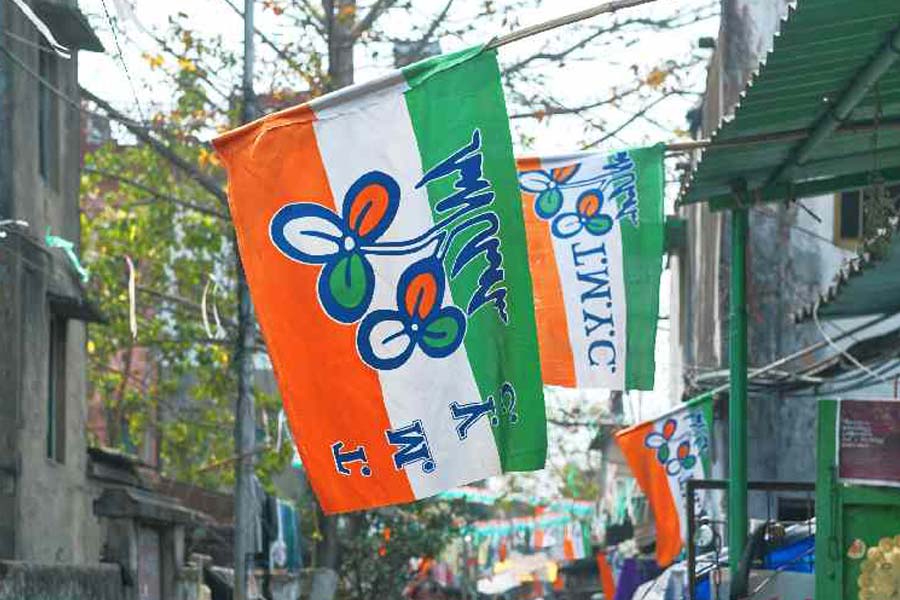When the news of the death of Peruvian novelist and Nobel Laureate Mario Vargas Llosa ricocheted among his sizeable readership across the oceans on Sunday, April 13, I was transported to a magical afternoon in Bangkok. All that flashed before my eyes was Mario Vargas Llosa’s face, impeccably sculpted, kohl-lined eyes, sitting on an effulgent golden Thai silk couch, legs that stretched way beyond the couch, taking my hand and kissing it. His smile was as broad as his manicured hands.
In a dream job as a literary columnist who interviewed the haute monde of Booker winners and Nobel Laureates, I met many titans of the literary firmament, but Llosa was a writer who had made me catch my breath several times during that one-hour interview that stretched to two. Swinging his legs suddenly, and standing up like a well-rehearsed flamenco dancer, the first words he said to me were: “In art, as in life, everything is attitude.” Since, that advice has guided me in my work and play.
It was two decades ago, that the afternoon sun had caught the flecks in his eyes. I remembered the explicit lines from his book Feast of the Goat as I returned his winning smile: “Occasionally a man would stick his head out from a vehicle and her eyes would meet a pair of male eyes that look at her breasts, her legs, her behind. Those eyes… In New York, nobody looks at a woman with that arrogance anymore. Measuring her, weighing her, calculating how much flesh there is in each one of her breasts, and thighs, how much hair on her pubis, the exact curves of her buttocks. She closes her eyes, feeling slightly dizzy. In New York, not even Latins — Dominicans, Colombians, Guatemalans — would give such looks. They’ve learned to repress them. Realised they mustn’t look at women the way male dogs look at female dogs, stallions look at mares, boars look at sows.”
It took me a flash to realise Llosa was one of a kind. We were at the opulent author’s lounge at the Mandarin Oriental Hotel Bangkok, which emanated literary history like no other space in the city. This is where Somerset Maugham, Graham Greene, Norman Mailer and so many others had written or visited or arrived for rest, relaxation and recharge. Vargas Llosa was there to deliver the annual lecture at the Southeast Asian Writers Award. Although he had a comfortable upbringing, he was constantly haunted by the spectre of domination and masculinist repression by the US, and this drove the engine of all his works.
Mario Vargas Llosa was born in 1936 in Arequipa, Peru’s second largest city. During his childhood in Cochabamba, Bolivia, and Piura, a city in the north of Peru, he believed that his father had died. However, this was a lie told by his mother to conceal their torturous separation. In 1946, his father suddenly came to take him away from his mother’s parents. They went with him to Lima. This led to an abrupt change in Llosa’s life — from a gentle, feminine environment to the hostile treatment of an authoritarian father. He was to discover fear, injustice and violence first-hand. And with the political ethos in Peru sharpening and all bastions of normal life crumbling, the young Llosa realised his domestic dysfunctionality was reflected in the larger national crisis. At the time, Alexander Dumas and Victor Hugo’s writings kept the young man absorbed. The Peruvian dictator Manuel Odria rose to power in 1948 and, over the next eight years, while Llosa studied law and literature at the University of San Marcos, Odria legislated rigid controls on social life, which tried to erase individuality, which in turn brought a wave of frustration among Peruvians. This period later inspired his novel Conversation in the Cathedral, published in 1969.
Personal freedom was the first principle of young Vargas Llosa’s life. And all his literary works were a condemnation of systems which tried to stifle personal freedom. The Time of the Hero (1963) evinces his loathing of manifestations of power and the absence of law which enables the strongest to impose their will. The inspiration for this novel was the time he spent between 1950 and 1951 in the Leoncio Prado Military Academy, where he was sent by his father to stifle his literary ambitions through military discipline. However, Vargas Llosa managed to rebel against his father, not only pursuing a writing career but as signposted by many of his biographers, marrying his maternal uncle’s sister-in-law Julia Urquidi, who was 11 years older than him and divorced.
I pointed out that his unflinching faith in democracy, with pluralism and a free press, is well known. However, did this kind of steadfast devotion to truth land him in great trouble? “Oh, without any doubt,” he had said with a laugh. “This is inevitable. If you keep mum, it is no problem but if you participate and defend what you believe, then you have to pay the price,” he maintained. How did he break the publishing ceiling and break through as one of Latin America’s greatest literary exports? Vargas Llosa maintained that it was sprouting wings and moving away from the parochial and financial limits of Peru that changed his life drastically in 1958, when he won a grant to pursue a doctoral thesis in Madrid. “Before I went to Europe in the ’50s, I didn’t dare be a writer. In the Latin American countries, literature was an activity that was so marginal to the mainstream of society that it was impossible to make it financially viable. The thinking was, during the whole week you worked in a proper job as a lawyer, a teacher or a journalist. On Sundays and holidays, you could write. But I realised quickly that if you keep writing in the margin of your life, and let everything else get in the way, you will never be a writer. So it was in 1958 when I went to Spain that I decided to dedicate most of my time and energy to writing.” Happily married for the second time, he would devote almost the entire day to work — conceptualising, organising, and thinking of plot and character. Working in a public library made him feel most inspired.
Vargas Llosa began writing plays in the 1980s, but it was not until 2005 that he decided to take to the stage himself to portray his characters. Aitana Sanchez Gijon, the actress who accompanied him in this new adventure, has described him as a promising young actor. I had prophesied in 2002 when we met that he would win the Nobel. At that time, he was working on Paradise on the Other Corner, about Flora Tristan, a women’s rights activist and artist, Paul Gauguin’s grandmother. He commented: “Men are not reading anymore. If literature survives, it will be because of women. This is a fact I encounter every time I sign books, go to bookshops and encounter readers in libraries.”
He could be a conquistador, or a tango dancer, although he sat worlds away from Central or South America, at the luxurious hotel in Bangkok. Ensconced with the effortless ease of a prince, this was the great Peruvian novelist whom I both loved and had some discomfort with. Loved because of the courage of his pen, where he unashamedly wrote angrily about the brutal self-aggrandisement of American interests — corporate and the CIA — in the Latin American countries, but was uncomfortable with his representation of women’s bodies.
I asked him if he expected to be the winner of the Nobel prize in 2002, which was to be announced just two hours after our conversation (it went to Hungarian writer Imre Kertesz). With absolutely no hesitation and with a sweeping wave of his scented hand, he said, “No. That is a lottery, I don’t want to think about that as a writer. And anyway, how can you predict a winner in a lottery?” He did eventually win it in 2010.
Vargas Llosa is known for his shooting-from-the-hip technique, where he fiercely tells the story of Colombia, Peru, the Dominican Republic, and other nation-states that the US corraled into submission by either corporate hegemony or through collusionism or coups. Vargas Llosa’s truth-telling through his fiction is synonymous with talking back to the centre, even if the centre is the all-powerful US, where, in the ’50s the CIA was a law unto itself.
In the course of our conversation, the author reminded me. “Being in a mould and the mastering of a technique is missing the point about being a writer. It’s something moral, a kind of commitment to what you believe to be the truth that makes you passionate about writing. A writer’s job is to defend with conviction and integrity, rigour and imagination, what he believes in. That is the kind of honesty a writer needs to have,” Vargas Llosa about the courage needed by a writer to critique political brutality or disregard for humanity. “Writing a novel is a ceremony similar to a striptease,” he had once said. “Just as the girl in the spotlight casts off her clothes and reveals her secrets one by one, the novelist bares his intimate being through his novel.”
At the end of two hours, I was playing with the idea of whether to broach the well-publicised topic of him getting physically violent with his friend, the Colombian novelist Gabriel Garcia Marquez — and I did. A wicked smile trembled on his lips. “In life, you must know when to let bygones be bygones. Enough has been said about that incident, and now I think we should put a happy end to it. Gabo (Marquez) has been a long-time friend, and let it be like that.”
Julie Banerjee Mehta is the author of Dance of Life and co-author of Strongman: The Extraordinary Life of Hun Sen. She has a PhD in English and South Asian Studies from the University of Toronto, where she taught World Literature and Postcolonial Literature for many years. She currently lives in Kolkata and teaches Masters English at Loreto College, is a literary columnist for t2oS and curates and anchors the Rising Asia Literary Circle










